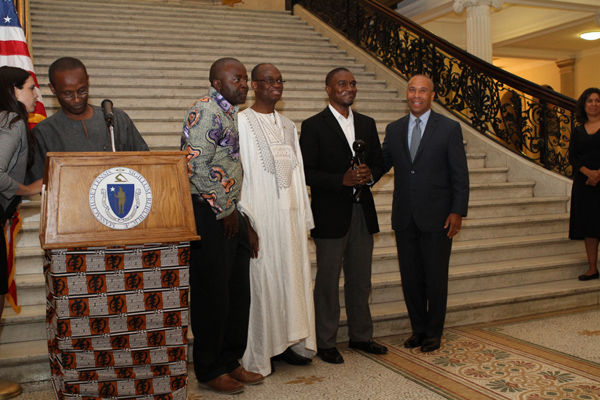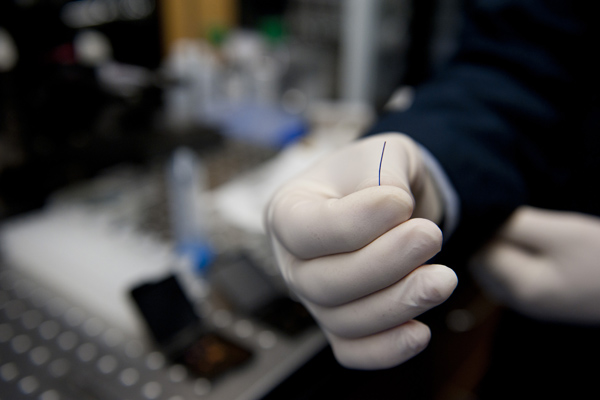Alum earns entrepreneurship award for startup

When Asanterabi Malima was 15, his father suffered a fatal heart attack at 57. He had been an accomplished scholar and minister in the Tanzanian government. “Everyone in my family is in politics,” said Malima, PhD’13, a graduate of the Department of Electrical and Computer Engineering and now a postdoctoral researcher in Northeastern’s Center for High Rate Nanomanufacturing.
They all expected he’d keep with the family business, but his father’s early passing set Malima on a different course. “My passion was always to develop some kind of technology to diagnose diseases earlier, to come up with something that wouldn’t save my father, since he’d already passed away, but may save somebody else’s parent,” Malima said.
In 2012, this vision became a reality when he founded Biolom with fellow Northeastern alumni Cihan Yilmaz, PhD’13, and Jaydev Upponi, PhD’12, graduates of the Department of Mechanical and Industrial Engineering and the Department of Pharmaceutical Sciences, respectively. They started the biotechnology firm to commercialize a device they had developed at the center under the guidance of its director Ahmed Busnaina, the William Lincoln Smith Chair and professor in the College of Engineering.
Their device is smaller than a pinhead and has the capacity to diagnose a variety of diseases at their earliest stages.

Malima’s work has received significant recognition. In June, as part of Massachusetts’ celebration of Africa Week, Gov. Deval Patrick presented him with the Entrepreneurial Award, which honored his contribution to the state’s economic well-being and vitality. But not only does Biolom promise to improve the health and job prospects of the state’s residents, it also has the potential to cure disease in Malima’s native Tanzania, where cervical cancer is predominant.
Biolom’s device consists of four distinct areas, each of which can be optimized to detect a specific biomarker—such as those that indicate different types of cancer or cardiovascular disease. With cervical cancer, a device like this could be invaluable for its ability to quickly and inexpensively turn around diagnoses when the cancer is first taking root.
The team originally developed the device to detect colorectal cancer, but it pivoted to focus on liver cancer after an exhaustive field survey of clinicians, researchers, and members of the pharmaceutical industry.
View video here.
“In more than 50 percent of the patients that have tumors, they are missed” Malima said. That’s because the biomarker that clinicians typically use to monitor for the disease doesn’t reach meaningful concentrations until a tumor has grown to significant size. “Usually once somebody develops symptoms, he or she only has about nine to 12 months to live,” Malima explained.
But there are other approaches to detecting liver cancer, namely two other less-often used biomarkers. The team decided to reconfigure its device to be able to detect all three biomarkers simultaneously. The approach, Malima explained, is expected to bring clinical sensitivity from 50 to 90 percent when the combination of biomarkers is used.
Starting a company has brought with it its own set of unique challenges, quite distinct from those of any engineering problem that Malima has yet encountered. Along the way, Biolom has received support from the Center for Research Innovation, the Health Sciences Entrepreneurs program, and IDEA—Northeastern’s student-run venture accelerator—which provided mentoring as well as gap funding to support the clinical validation studies that are now underway.
“I never thought of myself as an entrepreneur,” Malima said. He expected to be the brains in the background, quietly tinkering away at large firms like Toshiba, where he worked for several months before pursuing his graduate education at Northeastern. Instead he’s working at the cutting edge of an industry that promises to change the face of disease diagnosis as we know it.
His father would be proud.
Read more here.